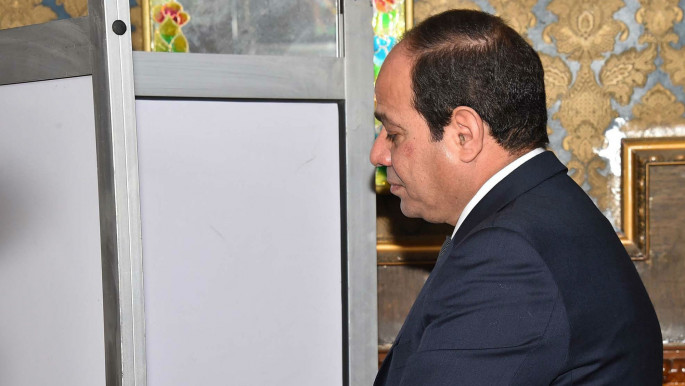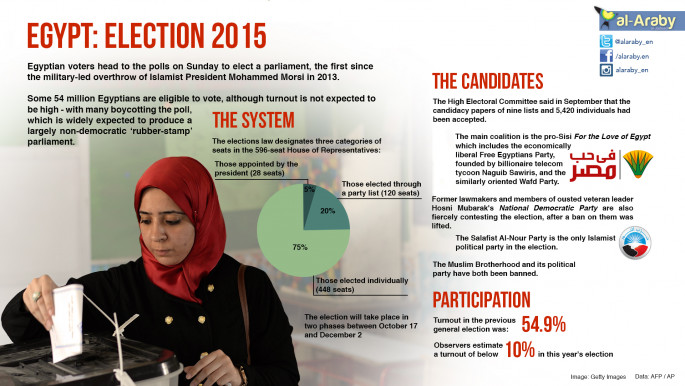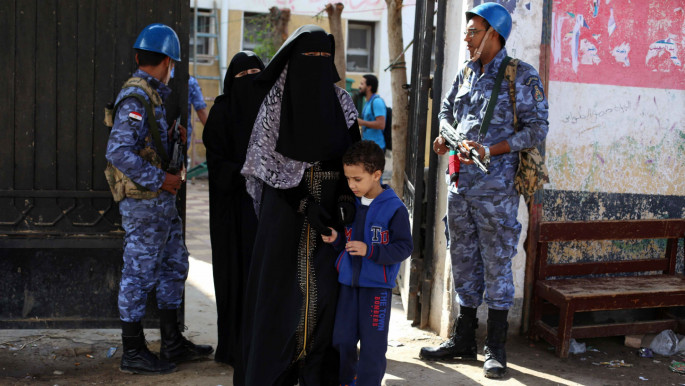Egypt elections: low turnout and empty polling centres
Egyptians trickled into largely empty polling centres as they voted Sunday in the second stage of parliamentary elections, reflecting widespread apathy and disenchantment.
3 min read
Many young people have become disillusioned with politics [Getty]
Egyptians returned to the polls on Monday for the second day of parliamentary elections across 13 of the country's 27 provinces amid reports of a low turnout on day one in the absence of any serious opposition.
The election is expected to elect lawmakers who firmly back President Abd al-Fattah al-Sisi, who has crushed all forms of dissent since ousting his Islamist predecessor Mohammad Morsi in July 2013.
 |
|
| Sisi's government has crushed all forms of dissent [Getty] |
"People aren't interested in the elections. Turnout has been low, the wind doesn't always blow the way sailors want," food cart worker Amm Ahmad told al-Araby al-Jadeed's Egypt correspondent
Candy floss street vendor Samir Marzouq agreed: "No one's come out to vote. I usually sell loads during election season but this year's been terrible for business."
Egyptian-American sociologist Saad Eddin Ibrahim said that voter turnout on the first day of the second round of elections was no more than 12 percent.
"Voter apathy reveals the state of popular discontent in Egypt under the military government of the 3rd of July coup," Ibrahim said on a pro-Muslim Brotherhood channel, according to al-Araby al-Jadeed's Arabic service.
Last month's first stage of voting saw a turnout of 26.6 percent, according to official statistics, however independent research organisations have said that, in reality, even fewer eligible voters actually turned out to cast their ballots.
A run-off held days later produced an even lower turnout of 21.7 percent.
Human rights groups have said observers on the ground have documented many violations on the first day of elections.
Some candidates hired buses to pick people up from their homes and take them to vote, according to the Maat Foundation for Peace, Development and Human Rights.
The NGO also observed campaigners outside polling stations distributing flyers, which breaks campaign silence regulations.
 |
"People have no idea that elections are going on today. The only people turning out are candidates' campaigners and relatives," said Mohammad Shawqi, 60, a grilled corn vendor.
The poor showing at the polls has prompted much sarcasm and mockery on social media, with many people tweeting out jokes using the Arabic-language hashtag #NoOneWent.
Egypt's last general election was held from November 2011 to January 2012 at a time of widespread enthusiasm following the ousting of Mubarak, and the first round saw turnout of 62 percent.
The resulting Islamist-dominated parliament was dissolved in June 2012, days before Morsi became the country's first freely elected president.
 |
|
| Thousands of troops have been deployed to safeguard the vote [Getty] |
Morsi was deposed a year later by then army chief Sisi after mass street protests against the Islamist's divisive single year of rule.
Sisi was elected to succeed him in 2014 after brutally crushing all forms of opposition - supporters of Morsi's Muslim Brotherhood as well as secularists and leftists.
The Brotherhood, for decades the country's main opposition group, has been blacklisted as a "terrorist" group and banned from competing, while several secular parties are either boycotting the latest polls or are badly represented.
The coup against Morsi saw a blistering government crackdown targeting his supporters that left more than 1,400 people dead, mostly in the streets of Cairo, and thousands imprisoned.
Hundreds more, including Morsi, have been sentenced to death after often speedy trials.





 Follow the Middle East's top stories in English at The New Arab on Google News
Follow the Middle East's top stories in English at The New Arab on Google News
![Israeli forces ordered bombed Gaza's Jabalia, ordering residents to leave [Getty]](/sites/default/files/styles/image_330x185/public/2176418030.jpeg?h=a5f2f23a&itok=_YGZaP1z)

